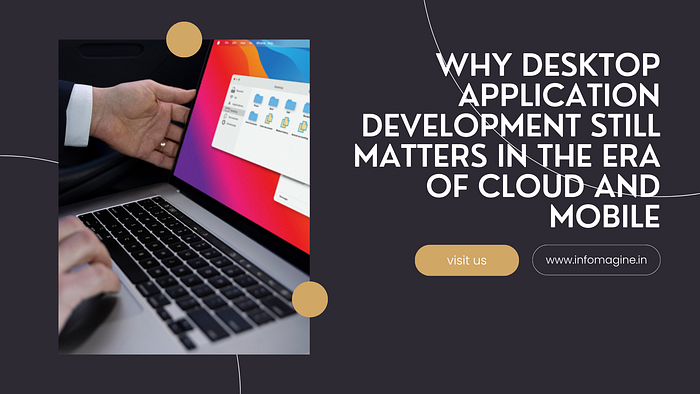
In an age dominated by smartphones and cloud-based solutions, it’s easy to assume that desktop applications have lost their relevance. However, that assumption couldn't be further from the truth. Desktop application development services continue to play a vital role in digital ecosystems, especially for industries that demand performance, security, and offline capabilities.
While web and mobile apps are widely adopted for their flexibility and ease of deployment, desktop software still offers unmatched benefits in certain scenarios. This article explores why desktop applications remain indispensable for many businesses and how they complement modern cloud and mobile ecosystems rather than compete with them.
1. Superior Performance for Resource-Intensive Tasks
Desktop applications are known for their ability to utilize local hardware resources efficiently. Whether it’s high-end graphics rendering, complex simulations, large-scale data processing, or enterprise-level software operations—desktop software handles these tasks much more smoothly than cloud or mobile apps.
For instance, industries like video editing, architecture (CAD), and engineering still rely heavily on desktop-based tools for their heavy processing needs. Cloud solutions often suffer from latency or bandwidth limitations, which make them less suitable for such tasks. This is where desktop applications shine by offering high-speed, uninterrupted functionality.
2. Offline Accessibility and Reliability
One of the biggest advantages of desktop applications is their ability to function offline. In regions with unreliable or slow internet connections, desktop applications become crucial. Even in developed countries, field workers or remote employees may not always have access to high-speed internet. In such cases, relying solely on cloud or web applications can disrupt workflows and reduce efficiency.
Offline functionality ensures that critical operations can continue without interruption, allowing users to save their data locally and sync when internet access becomes available. For mission-critical systems—such as hospital management, retail POS systems, or manufacturing control systems—desktop apps offer the reliability businesses need.
3. Enhanced Security and Control
Data security continues to be a top concern for organizations worldwide. Cloud-based applications are vulnerable to cyber threats, especially if they are not properly configured or maintained. While cloud vendors invest heavily in security, some businesses prefer to have full control over their systems, data storage, and access permissions.
Desktop applications offer better control over the data since everything is stored locally or on private servers. For companies in finance, healthcare, defense, or legal sectors, this level of control is essential to meet compliance standards and reduce exposure to third-party risks. Additionally, firewalls and on-premise encryption can be more effectively applied to desktop systems.
4. Deep Integration with Hardware and Operating Systems
Desktop applications can interact more directly with system hardware than browser-based applications. This is especially important for software that requires access to peripherals such as printers, scanners, biometric devices, or industrial equipment.
By tapping into system APIs and local drivers, desktop apps can offer better integration, faster processing, and advanced features that are simply not possible with web or mobile applications. This makes them a preferred choice for customized business solutions, manufacturing tools, and specialized scientific software.
5. Long-Term Cost Efficiency
Although initial development and deployment costs for desktop applications might be higher than those of cloud apps, they often prove more cost-effective in the long run. There are no recurring cloud subscription fees, and updates can be controlled internally, which reduces vendor lock-in and operational overhead.
Moreover, for organizations with strict IT budgets, deploying software on existing desktop infrastructure can avoid the recurring costs of hosting, bandwidth, and cloud storage.
6. Ideal for Enterprise Environments
In corporate settings, desktop applications often provide a more stable and feature-rich environment for employees. Enterprise resource planning (ERP), customer relationship management (CRM), HR tools, and financial systems are still commonly used as desktop solutions because of their deep functionality and user customization options.
With central administration and role-based access, IT teams can manage software updates and security settings without relying on external networks or services.
Conclusion
While the world continues to move toward cloud computing and mobile-first solutions, desktop applications are far from obsolete. They offer distinct advantages in terms of performance, security, offline access, and hardware integration. For many businesses, these strengths are critical for smooth and secure operations.
That’s why it’s important to choose a partner who understands these unique needs. Partnering with a trusted desktop application development company can ensure your business leverages the power of desktop software alongside modern digital technologies. With the right development approach, desktop applications can serve as a powerful asset in today’s hybrid digital environment.





Comments